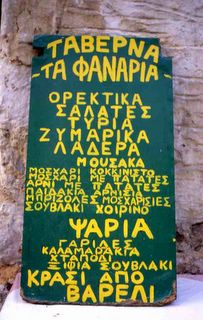
(To blog readers: : My son is traveling to Greece in April with a group from Massachusetts’ Oliver Ames [OA] High School [see March 5 post]. To give students and parents a glimpse of some of the places on the group’s itinerary and to provide links to sites the travelers may find helpful, I’m devoting 10 consecutive daily posts from March 22 through March 31st to places on the kids’ Greek itinerary. [I can’t think of a better place than Greece to hang, really or virtually, but if you’d like to go elsewhere, cruise the archives to visit scores of other great places, from Jamaica to Jordan, Malta to Mexico.] Wherever you end up, Kalo taxidi! Have a good trip.)
You start to see them the minute you step off the plane in Athens – strange-looking letters, some of which have no equivalent in the Latin alphabet you’re used to, strung into strange-looking words. Time to break out your secret decoder ring (a chart like this one, showing upper and lower case Greek letters and their pronunciations. Print this or one of the other charts linked to in this post, or make sure there’s a good one in your guidebook).
This post is a quiz of sorts. The taverna menu in the photo above is a good example of what you’ll see everyday in Greece. Crack the Greek alphabet code, and you’ll be able to tell whether this taverna, whose menu is written entirely in Greek with no transliteration into Roman letters, offers souvlaki, those mouthwatering grilled meat kebabs you’ve been itching to try.
Let’s start at the top of the menu. The Greek and Roman alphabets share many common letters with identical or similar pronunciations, reducing the amount of decoding work you actually have to do. But all is not as it seems. You might think “TABEPNA” is pronounced “ta-BEP-na.” Nope. In Greek, the B isn’t b and the P isn’t p. B is the upper case form of vita, pronounced “v.” P is the upper case form of ro, pronounced like a rolling “r.” So, TABEPNA is “ta-VER-na.” (Make sure your decoder ring…er, alphabet chart, shows both upper and lower cases, as the lower case versions of some letters look nothing like their upper case parents – Y and v, and H and n, for example – all of which are pronounced “ee.”)
So what can you get at the Lantern Taverna in the stunning city of Nafplio? (The words under TABEPNA transliterate to “Ta Fanaria” – “at the lanterns.”)
Consulting your decoder ring letter chart, you decipher that the first three items under the establishment’s name are Orektika – hors d’oeuvres like olives, cocktail onions, almonds, hard-boiled eggs, bits of squid; Salates – salads; and Tiria – cheeses.
Your turn. Find the potatoes. Two hints: the Greek word transliterates to patates, and the “p” is that good old Greek letter you learned in math, pi. Once you’ve nailed the potatoes, find the souvlaki. It’s there, twice, and it starts with a letter that looks like a sideways “M” but is really sigma, the Greek “s” sound. If you find the souvlaki, sniffing out the moussaka will be easy. Sigma’s in moussaka, too.
It may still be Greek to you, but with a little detective work, at least you’ll know how to pronounce it.
Now, put your pronunciation skills to work learning some key Greek words and phrases. Little things really do mean a lot, and by attempting a few Greek words, you become an ambassador for your country and a very cool citizen of the planet. Your guidebook should have a basic vocabulary, and these links to smartphrase.com and greece.org offer some, as well.
Before traveling to any country, you should, at a minimum, learn to say hello, good-bye, thank-you, please, yes, no, good, sorry. You’ll be amazed at the goodwill you’ll generate by attempting these few simple words. Your effort to say something – anything – in a country’s native tongue demonstrates respect. And, you’ll be amazed at how useful these eight words can be. Coupled with body language – smiling, pointing, shrugging, head-knodding, hand gestures – these eight words, alone or in combination, can carry you through quite a few encounters. You can, for example, complement a cook, restaurant owner or waiter on a wonderful meal by pointing to your plate, smiling, and saying, “Good. Thank-you.” If your guide raises an invisible camera to his eyes, his way of asking if you’d like to stop and take a photo, “Yes, please” will stop the bus. And, if you accidentally bump into a fetching member of the opposite sex, you can excuse yourself and indicate interest by saying, with a smile, “Sorry! Hello…” Endless combinations and possibilities…
Here’s the easiest way to say hello, good-bye, thank-you, please, yes, no, good and sorry in Greek (transliterated into super-simplified sounds so you can start practicing right away without consulting your decoder ring...):
Hello: YA-soo
Goodbye: an-DEE-o
Thank-you: ef-ar-ee-STO
Please: pa-ra-ka-LO
Yes: neh
No: O-hee
Good: ka-LO
Sorry: sig-NO-mee
Eight magic words, in any language.
Comments or questions? Email me
www.LoriHein.com
